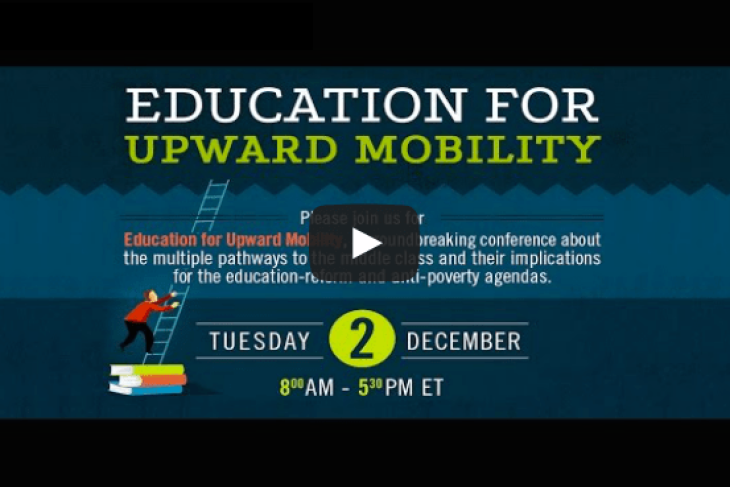A core assumption of the education-reform movement is that excellent schools can be engines of upward mobility. But what kind of schools? And to what end?
In tandem with the release of several papers, this path-breaking conference will consider thorny questions, including: Is “college for all” the right goal? (And what do we mean by “college”?) Do young people mostly need a strong foundation in academics? What can schools do to develop so-called “non-cognitive” skills? Should technical education be a central part of the reform agenda? How about apprenticeships? What can we learn from the military’s success in working with disadvantaged youth?
Panel I: Escaping Poverty through Education, Work, and Personal Responsibility
About a third of the individuals who grow up in poverty in America climb the ladder to the middle class as adults. What do we know about their trajectory? How can we increase these numbers? What role does education play? Higher education? Industry certifications and other non-degree credentials? Apprenticeships? Following the “success sequence” (get a high school diploma, work full time, and wait till age 21 to marry and start a family)?
Presenters
Ron Haskins, Brookings Institution: “Education and the Success Sequence”
Andrew Kelly, AEI, “Big Payoff, Low Probability: Postsecondary Education and Economic Mobility in America”
Tamar Jacoby, Opportunity America, “The Certification Revolution”
Robert Lerman, Urban Institute, “How Apprenticeship Can Spur Upward Mobility”
Respondent
Reihan Salam, National Review Institute
Panel II: Multiple Pathways in High School
We dive deep into the “make or break” time for social mobility—the adolescent years, when many students are making critical choices that impact the rest of their lives. A key question
is whether we should move away from “comprehensive” high schools and today’s widespread focus on “college prep for all” and towards a “multiple pathways” approach, including high quality Career and Technical Education and youth apprenticeships.
Presenters
Peter Meyer, Independent Writer, “Small Schools of Choice”
Joanne Jacobs, Independent Writer, “College Prep High Schools for the Poor”
Bob Schwartz, Harvard University, “High Quality Career and Technical Education”
Respondent
Marc Sternberg, Walton Family Foundation
Respondent
Marc Sternberg, Walton Family Foundation
Keynote Address: Hugh Price, Senior Fellow, Brookings Institution “What the Military Can Teach Us About How Young People Learn and Grow”
Panel III: Zero to Thirteen
Next, we examined the foundational years. What are the best practices of poverty-fighting in pre-schools, elementary schools, and middle schools? How can the prek-8 years get as many lowincome children as possible ready for success across multiple pathways? Should we embrace ability grouping and tracking? A heavy focus on “non-cognitive skills” like drive and prudence?
Presenters
Elliot Regenstein, Ounce of Prevention Fund, “Starting at five is too late: Early childhood education and upward mobility”
Robert Pondiscio, Fordham Institute, “Poverty-fighting Elementary Schools: Knowledge Acquisition is Job One”
Tom Loveless, Brookings Institution: “Tracking in Middle School”
Respondent
Dacia Toll, Achievement First
Panel IV: Implications for the Education Reform and Anti-Poverty Agendas
This final panel considered the implications of the day’s proceedings for policy and practice, in both the worlds of education reform and broader efforts to alleviate poverty.
Panelists
Sheldon Danziger, Russell Sage Foundation
Howard Fuller, Black Alliance for Educational Options
Rick Hess, American Enterprise Institute
Andy Rotherham, Bellwether Education Partners

